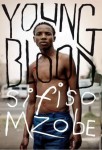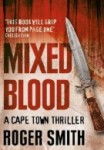News From South Africa
 By Mike Nicol
By Mike Nicol
Back in 2005, the top literary award in South Africa (the Sunday Times Fiction Award), went to a novel that was really a crossover between crime fiction and general fiction, in that some of it was conventional police procedural. The book was Coldsleep Lullaby by Andrew Brown and was the first time the award had been given to a book that fell as easily into a genre as it did into the serious highbrow category.
And now it’s happened again that the Sunday Times Fiction Award has gone to another hybrid. This time the book is part a coming of age novel, part a tale of criminal life in the vicious underworld of the township of Umlazi, near Durban. The book is by Sifiso Mzobe and called Young Blood. It’s his first novel and apart from the Sunday Times prize also won the 2011 Herman Charles Bosman award for fiction.
Last year I did an interview with Sifiso on Crime Beat and asked him, among other things, about the car hijacking that goes on in that township and forms such a central part of the novel.
 He replied: ‘Umlazi is the car stealing capital of this province. Young boys do things you never thought were possible in a car. Vitality is the correct way to describe it since that’s how they feel when behind the steering wheel. They feel it is the only time they shine. I had to be true to the story, I could not tell the story of Sipho and leave out moments that make him feel like he is alive. My township is a strange place, we grow to choose different paths but because you are a doctor does not mean you stop being friends with a childhood friend just because he steals cars for a living. It was through these friendships that the moral tone developed. It was constant in most conversations I had with former and current car thieves, they wish they had more alternatives. Most regret that they are criminals. I saw someone just out of jail for car theft and he told me, “I’m through with this”. He has a child, no one hired him, weeks passed. When I saw him in a stolen car, I really could not judge. The moral tone came from situations like that.’
He replied: ‘Umlazi is the car stealing capital of this province. Young boys do things you never thought were possible in a car. Vitality is the correct way to describe it since that’s how they feel when behind the steering wheel. They feel it is the only time they shine. I had to be true to the story, I could not tell the story of Sipho and leave out moments that make him feel like he is alive. My township is a strange place, we grow to choose different paths but because you are a doctor does not mean you stop being friends with a childhood friend just because he steals cars for a living. It was through these friendships that the moral tone developed. It was constant in most conversations I had with former and current car thieves, they wish they had more alternatives. Most regret that they are criminals. I saw someone just out of jail for car theft and he told me, “I’m through with this”. He has a child, no one hired him, weeks passed. When I saw him in a stolen car, I really could not judge. The moral tone came from situations like that.’
If you want to read the whole interview click through, here.
And while on the subject of interviews, recently Roger Smith talked about his novels and his upcoming third book, Dust Devils, to the website AfricaBookClub.
Of Dust Devils he had this to say: ‘With Dust Devils I set out to write a bloody, amped-up page-turner, but I wanted it to be fuelled by the things that anger me about South Africa.
 ‘When apartheid ended and Nelson Mandela came to power, there was a period in South Africa where we went from being the pariah of the world, to a role-model for transformation. A giddy time. Then Mandela moved on, and the rulers of the country became ever more self-serving and corrupt, as politicians tend to do.
‘When apartheid ended and Nelson Mandela came to power, there was a period in South Africa where we went from being the pariah of the world, to a role-model for transformation. A giddy time. Then Mandela moved on, and the rulers of the country became ever more self-serving and corrupt, as politicians tend to do.
‘Apartheid is over, but a violent crime epidemic, poverty and the highest incidence of HIV/ AIDS in the world present new challenges that are left largely unaddressed. Our constitution is glowing testament to enlightenment and individual freedom, but teenage girls are sold into slave marriages in the name of tradition and some men believe that raping virgins (often children) will cure them of AIDS. The ex-commissioner of police has been sentenced to fifteen years in prison for corruption.
‘This is the background against which Dust Devils is set, and what I’ve written is no love letter.’
He was also asked about life on the Cape Flats, which was the setting of his two earlier novels, Mixed Blood and Wake Up Dead.
‘Recently the French Slate magazine ranked Cape Town the most dangerous city in the world, ahead of Baghdad, Rio and Juarez, Mexico. The Cape Flats – the sprawling ghetto outside Cape Town – is home to millions of people of mixed race, where the rape, murder and child abuse statistics are hard to believe.
‘In both Mixed Blood: A Thriller and Wake Up Dead – which are linked by theme and geography even though they are stand-alone thrillers – I was interested in showing the contrast between privileged Cape Town and the Cape Flats, and wanted to capture the reality of many people’s lives, without sentimentalizing that reality, even if it’s uncomfortable.
 ‘Just minutes outside Cape Town is the massive Pollsmoor Maximum Security Prison. Built to house 5000 men; home to double that. Mostly men from the Cape Flats. Doing research for Wake Up Dead, I met some of these men. They had a similar story to tell: under apartheid, going to prison was inevitable if you weren’t white. And in the racially segregated prisons they quickly found they had power over weaker brown men. They joined the prison gangs, wore the tattoos of rank, murdered fellow inmates as part of initiation rites. Found that they never wanted to leave this world of brutal discipline and unbreakable codes. Every time they came up for parole they committed another crime and had time added on to their sentences, and gained more power in the gangs.
‘Just minutes outside Cape Town is the massive Pollsmoor Maximum Security Prison. Built to house 5000 men; home to double that. Mostly men from the Cape Flats. Doing research for Wake Up Dead, I met some of these men. They had a similar story to tell: under apartheid, going to prison was inevitable if you weren’t white. And in the racially segregated prisons they quickly found they had power over weaker brown men. They joined the prison gangs, wore the tattoos of rank, murdered fellow inmates as part of initiation rites. Found that they never wanted to leave this world of brutal discipline and unbreakable codes. Every time they came up for parole they committed another crime and had time added on to their sentences, and gained more power in the gangs.
‘Readers from the Cape Flats are very positive about my books and say that they accurately reflect life on the Flats. I often get comments that, if anything, I have down-played how brutal the Cape Flats environment is.’
Read the full interview, here.
Another snippet of news about Roger is that he scored a hat-trick in Germany by notching into first place on the KrimiZeit top ten bestseller list for July with Dust Devils. The highly regarded list is compiled by 17 German, Swiss and Austrian crime fiction critics. It’s not the first time Roger’s taken the top rank, he did it with Mixed Blood and Wake Up Dead. Also on the list was another SA-set crime novel, Malla Nunn’s Let the Dead Lie.
And then Deon Meyer’s Thirteen Hours has popped up on two international shortlists: the Mystery Readers International’s list for Best Mystery Novel; and he’s a frontrunner for the Barry Award’s in the Best Thriller category.
- News From South Africa - December 31, 2011
- News From South Africa - November 30, 2011
- News From South Africa - October 31, 2011
